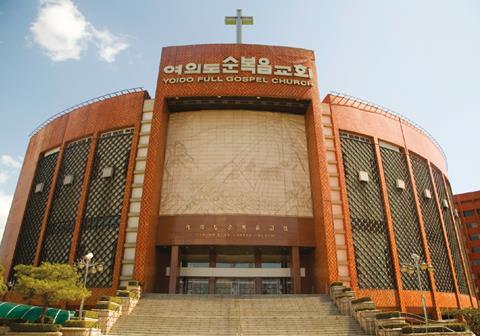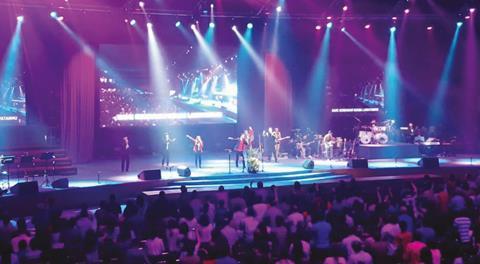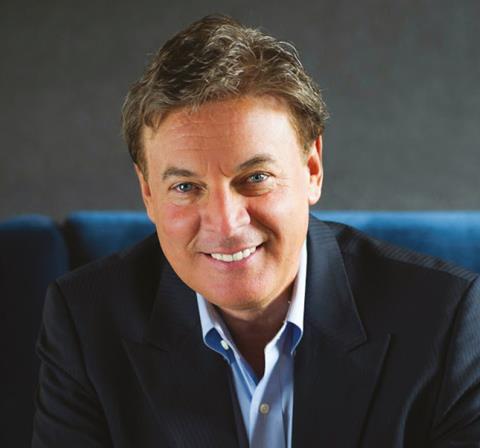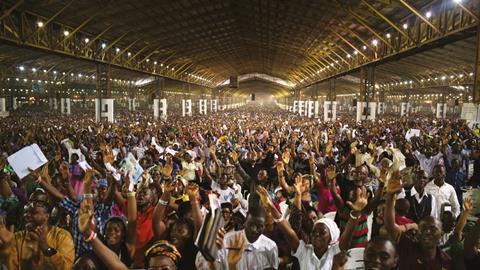The agnostic journalist Elle Hardy has been investigating how Pentecostalism is taking over the world. Here’s what she discovered
As a non-believer, I’ve spent the last few years travelling to twelve countries trying to understand how Pentecostalism has grown so quickly, and why it’s become so significant – and what I found was equally surprising, fascinating and disturbing. My book, Beyond Belief: How Pentecostal Christianity is Taking Over the World, (Hurst), is hubristically titled to highlight the depth and breadth of the movement, as well as its ambition and influence. The popularity of the faith is something many Christians are unaware of too: the mass conversions in Brazil, for example; the high instances of North Korean defectors being born again on the underground railroad to the South; the British Gypsy and continental Romani populations finding the Spirit in huge numbers.
Owing largely to birth rates, Islam and Hinduism are the great competitors in the global race for souls, but no one is getting people in the tent quite like the Pentecostals. By some estimates, the movement is converting 35,000 new followers each day. At present, the number of Pentecostals are estimated to be 600 million – well over a quarter of the world’s Christians. By 2050, that number is expected to reach 1 billion, or one in ten people on earth.
THE NUMBER OF PENTECOSTALS ARE ESTIMATED TO BE 600 MILLION
When it comes to defining Pentecostals, they tend to go by different names in different places, so I broadly use the term to define people who believe in receiving the Holy Spirit after being born again. On the ground, there’s evidence that Pentecostal practices are influencing large tracts of followers of Jesus. I’ve heard of Catholic churches playing Hillsong worship songs and Orthodox churches in Eastern Europe allowing more charismatic practices for fear of losing parishioners. I suspect that the recent split in the Southern Baptist Convention in the United States was caused, in part, by the rising influence of Spirit-led churches in both practice and politics. There’s even a Nigerian Islamic sect taking on Pentecostal ideas to stop the flow of Muslims to megachurches.
A SOCIAL REVOLUTION
Raised vaguely Catholic and now firmly agnostic, I fell into the Pentecostal world entirely by accident. In 2018 I spent six weeks in Waco, Texas, reporting on the little-known, but rapidly growing, Pentecostal-led industry of reform schools for men caught soliciting prostitutes, known as ‘John schools’. The couple who ran the school weren’t ones for labels, and they certainly didn’t court the ‘fake news media’ that I apparently belonged to, but they agreed to let me take a front row seat for what they considered to be a social revolution.
Loosening their distrust, these Christian revolutionaries revealed why they had let me join them. The inspiration for their mission had come from watching YouTube videos by Christine Caine, who cut her teeth at Hillsong Church in my native Sydney, Australia. She has been leading a campaign in the United States – and now the world – to end ‘sexual slavery’. As I came to learn, that term wasn’t all that it perhaps seemed. The movement casts all sex workers as victims, when some work by choice (as one pointed out to me, it pays far better than bagging groceries at the supermarket). It also works closely with police – often no friend of the workers in the industry – and puts many men in the carceral pipeline, often costing them their families and livelihoods. While many Christians applaud the work of Caine, and others like her, for me it was a dispiriting introduction to the Pentecostal mission.

JOURNEY OF DISCOVERY
My travels have since taken me far from that Texas classroom, and the hard-hearted ‘Make America Great Again’ types. Congregations from Mozambique to Guatemala have opened their doors and lives to me; my friends at Light & Life Gypsy Church in Dartford, Kent, still check in on me to see that I’m OK and if I need a pastoral ear. Sure, my new friends are still trying to save my soul, but they remain caring people who do Christianity proud.
RESEARCH HAS FOUND THAT PEOPLE HAVE MORE CHANCE OF ESCAPING POVERTY, VIOLENCE OR ADDICTIONS IF THEY JOIN AN EVANGELICAL CHURCH
They’re a tonic to the new atheism that I and many others were once part of. Now I think that movement is widely acknowledged as being as toxic and as dogmatic as the religion it wants to overthrow. I know it led me down some terrible political and moral paths where, filled with my own selfloathing, I found a vehicle to project a sneering, overly certain, holier-thanthou view of the world onto others. So, while undoubtedly godless, I took off on my quest with an open mind and an open heart, looking for miracles and wonders, and, in my own way, hoping that they might happen to me.
MODERN REVOLUTION
Before I began, I thought Pentecostals were tongue-babbling, snakehandling types from the Appalachian Mountains. But I soon realised that I’d unknowingly attended one of the world’s best-known Pentecostal churches when I was in high school. Hillsong Church was hardly a cultural fit; Australians are actively hostile to the people we call ‘happy clappers’ (and if the current media attention given to Hillsong is anything to go by, we still are). My parents were deeply uncomfortable with a friend’s family asking me to a Christian spectacular in 1999 – but there are worse things that teenagers can get up to on a Saturday night, so I joined tens of thousands of others at a typical Hillsong stadium event.
The pop-friendly worship music and high production values at Hillsong continue to this day. Recently, I attended their service at the Dominion Theatre in London. This young, multicultural, fashionable and energetic congregation was singing along to every word and giving themselves to the moment. More importantly, they represent Christianity in modern Britain. There are an estimated 17,000 Pentecostal churches in the UK – about one congregation for every two pubs in England, and slightly more churches than the Church of England. Exact figures are hard to come by, but it’s thought that the UK is home to around 3 million people who are part of the Pentecostal movement.
The dwindling numbers at many Church of England or Methodist congregations have seen them shutting up shop and renting out their buildings to the new kids on the block. That’s how the Light & Life lads got set up down in Dartford: a philanthropist bought up a number of unused churches and offered them to congregations for a peppercorn rent. The Church says that it now has 33 congregations and about 20,000 followers in the UK, which amounts to one-tenth of the estimated Gypsy population.

MEETING NEEDS
It’s this broad and fascinating coalition, and the social and political conditions underpinning it, that piqued my interest. For many immigrant and minority groups in the UK, Pentecostalism is critical to helping them navigate life here. It’s a phenomenon as common to domestic cleaners as Premier League footballers. Across the world, a pattern is emerging: for migrants, minorities, people feeling alienated in big cities, the working poor and people whose lives have fallen apart, joining a Pentecostal church is often the only game in town. It’s as true in the English suburbs as it is in Brazilian favelas or South African townships.
THERE’S EVIDENCE THAT THE PROSPERITY GOSPEL WORKS
Melanie Maynard, mother of Manchester United and England footballer Marcus Rashford, is a typical believer: a single mum of five from a minority background, holding down several jobs in order to try to give her kids a better life. Church, then, is one of the few places that offers services that the state does not, such as youth groups where kids can learn music and play football. Women form the majority of believers around the world and it’s not hard to understand why: in addition to fulfilling their spiritual needs, Pentecostal churches provide strong communities and support networks. The average Pentecostal is seeking solutions in this life, absolution for the next. Where, outside of the Church, can they get this?
Questions I field from nonbelievers are usually along the lines of: “It’s a cult” or: “They’re all suckers”. But conversion, to my mind at least, appears as highly rational as it is profoundly spiritual. While ideas such as the prosperity gospel are much-maligned (and its strongest proponents usually justify the criticism), Pentecostals have excelled at looking after people’s everyday needs. You could argue this theology is simply taking cues from the secular world: after all, we live in a world where we equate valuing something with paying for it. If Christianity has changed your life for the better, why wouldn’t you be generous when the offering plate is handed to you?
Pentecostals are probably right to assume that most secular, liberal people are looking down on them and their faith. That said, I found people of faith equal critics of the prosperity gospel. But here is the strange thing: there’s a lot of evidence that the prosperity gospel works. For every Rolexed, multi-millionaire preacher with a private jet and lavish lifestyle, there is the ordinary person who converts to Pentecostalism and sees an uplift in their circumstances.
Research has found that people who come from poverty, or cycles of violence and addiction, have more chances of escaping that world if they join an evangelical church. In the global South, where the majority of the world’s Pentecostals live, countries in economic distress see surges in faith. For every one per cent reduction in a country’s GDP, Brazilian researchers found a 0.8 per cent increase in the number of evangelicals.
Overall, the study found that “economic downturns lead to religious conversions to Pentecostalism from other Christian denominations”. But the expansion of Pentecostalism, triggered by economic downturns in the 1990s, was also accompanied by a shift in electoral outcomes and legislative production towards a religiously orientated political agenda. In other words, as one of the study’s authors put it: “these churches give vulnerable populations a solidarity network the state has failed to. In turn, the religious start voting for faith-based political candidates.
This is where the movement troubles me. Many of Pentecostalism’s religious entrepreneurs have become political entrepreneurs. They’re not really pastors any more, but executives who oversee a morally charged business operation. While in many ways pushing back against the modern world, Pentecostal preachers are keenly aware that they exist in a marketplace of ideas. At a time of real crisis, these ties to politics and identity are being exploited, and many Pentecostals are forming the theological wing of the wave of populist, nationalist movements around the world.
THE POLITICS OF FAITH
For the very real and important things that Spirit-led faith gives people, two particular doctrines disturb me: the seven-mountain mandate (7M), and spiritual warfare. The premise of 7M is that the seven pillars of society (Education, Religion, Family, Business, Government, Entertainment and the Media) have all been taken over by demonic powers. Emerging from right-wing prophets in the US, it tells believers to reclaim control of these ‘mountains’ before Christ can return. Key promoter of 7M, Lance Wallnau, says: “the goal is to occupy till he comes, not be preoccupied when you go”.

Many Christians will recognise the term ‘spiritual warfare’ but not necessarily understand how it is being used in some parts of the world, especially the global South; often tacitly encouraging violence and destruction, particularly against indigenous people and beliefs and, sadly, often led by other indigenous people who have themselves converted. In Guatemala, there have been a spate of murders of traditional priests and medicine men. As one Mayan priest explains it, they’ve come to learn that spiritual warfare is about doing Christianity – and doing it against indigenous people. Papua New Guinea’s speaker of parliament attempted to “purify and sanctify” Parliament House “by destroying special carvings”. These symbolised the country’s traditional culture, but for some Christians, they represented the presence of the demonic. Meanwhile, the conversion of aboriginal Australians has seen a young Tongan preacher encouraging her followers to set fire to sacred artefacts that represented “Satan and his demonic beings”.
From its earliest days in Azusa Street, Pentecostals have had an uncanny ability to tell two stories at once and this holds true today. It’s a faith that lifts people up, while also being biblically fundamentalist and ultimately at odds with a pluralistic, democratic society. These two stories are why I believe it’s growing at such a rapid pace: good people horribly let down by secular, liberal promises turning to God to improve this life, and dangerous political operatives looking to assert Christian dominion – by force if necessary. The Pentecostal promise is one of a victorious life, both here and now, and ever after.


































